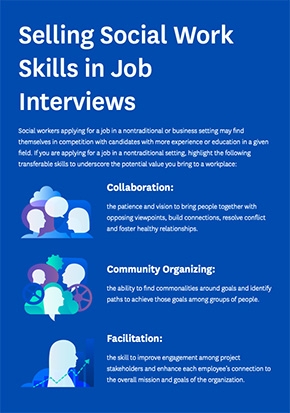Social workers play a valuable role supporting families and communities in need through tough challenges like homelessness, grief and mental illness. But earning a social work degree may open doors to careers that many in the field don’t initially consider.
Social workers are finding their skill sets are transferable and valuable in business and nontraditional settings, while businesses and other organizations ranging from NASA to IBM are recognizing the value social workers bring to workplaces by helping with challenges such as communication and relationship building.
“What our students bring into this is the human element,” said Tory Cox, Asst. Dean, VAC Field Education. “We’re training [students] on management; we’re training them on leadership; we’re training them on how to look at finances of an organization and how to make decisions on finances.”
Applying for a career in a nontraditional setting like a corporate office may put candidates with social work degrees in competition with job seekers who have education or experience in fields directly related to the business. But Cox believes social workers can distinguish themselves from those candidates because of their focus on human development and the ways in which humans interact with each other, which can lead to “a progression in the bottom line for an organization.”
Still, working in corporate or nontraditional settings can be a change for social workers.
“One of the things about moving from a nonprofit to corporate [workplace] is that there are definitely more resources,” said Jennifer Pelham, a social worker who has held jobs in HR at IBM and now works as a change management specialist at the health care management company Vituity. “They can spend a little bit more money on things,” such as books and team-building resources.
But that bounty of resources can also create conflict for some social workers who feel guilty about pursuing a career in social work with the intention of helping those in need.
“Ethically, they feel that they should be serving those who are the neediest in our population, those who have the least amount of power,” said Cox. “If you work for a corporation, you may feel that you’re actually supporting the people you might otherwise be fighting against, so there’s that bit of conflict that can occur.”
At a school panel discussion, USC alum April White Castañeda described the challenge of interviewing for her first internship working in HR at Caltech.
“It was hard for me to take that internship because I felt that these people had a lot of resources and that was in conflict with what I felt like I should be doing as a social worker,” she said. “My instructor said something really important to me. She said, ‘Pain is pain … no matter where it’s at or where it is, and where you can impact and help alleviate pain, that’s what you should be doing.’ And that really stuck with me.”
Cox says it is all about finding the right way of framing how this engagement works in corporations. He points to the importance of corporate social responsibility (CSR), which encourages businesses to engage in the community. Social workers can play an important role to make sure corporate social responsibility is in the footprint for that organization or business.
“How do you build bridges with the community so that your presence there actually enhances the value of the community and also serves the organization? Someone with social work skills can take on that task,” he said.
Finding a Social Work Job in a Nontraditional Setting
Marketing is critical for a social work graduate and persistence is key for an individual who wants to enter a business or nontraditional setting.
“There are not well-trodden pathways already in existence for this work,” Cox said. “Students who want to move in this space have to be persistent and be able to go into interviews where potential employers are talking to MBAs and answer the question: ‘Well, why are you here?’ ”
He noted many interviewers will likely see a social work graduate as a fish out of water, which interviewees have to be cognizant of and prepared to address.
“You have to sell yourself,” he said. “You have to sell your skills. You have to have tenacity and persistence. And don’t take ‘No’ for an answer.”
Like any graduate searching for work, social work grads need to cover all the bases for a job search with these topics in mind:
- Internship experience. Be able to articulate what you have learned or accomplished at an internship and why that is beneficial to an employer. Where you intern is important, but what you’re learning and what skills you have developed can be more powerful.
- Cover letters and resumes. Create and/or update your status and information on these important documents, emphasizing the experience and skills most applicable to a potential employer. The purpose of the resume is to inspire the employer to call you. The cover letter should not duplicate your resume but should expand on any details especially applicable to the job opening.
- Networking. During your school training and interactions with experts in your field of interest, make connections with professors, professionals, classmates and coworkers. They are resources for future employment.
- Informational interviews. Take the initiative to request informational interviews with people you can add to your network. These interviews can help you learn about the field, enabling you to confirm whether it is right for you. These are not job interviews but a conversation to learn more.
- Job openings. Job banks are a good place to start, including employment websites such as Indeed, Glassdoor and CareerBuilder. Use search phrases “corporate social worker,” “corporate social responsibility,” and “employee assistance program” to get started. Search job boards for professional organizations such as the National Association of Social Workers and the Association for Community Organization and Social Administration. For a more comprehensive list, see the USC Suzanne Dworak-Peck School of Social Work’s Career Resource Links page.
Citation for this content: The DSW@USC, the online Doctor of Social Work program at the University of Southern California.

